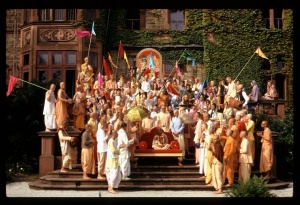SB 4.9.25: Difference between revisions
m (1 revision(s)) |
No edit summary |
||
| Line 1: | Line 1: | ||
{{info | {{info | ||
|speaker=Lord | |speaker=Lord Viṣṇu the Supreme Personality of Godhead | ||
|listener=King Dhruva | |listener=King Dhruva | ||
}} | }} | ||
[[Category:Srimad-Bhagavatam - Canto 04 Chapter 09]] | |||
[[Category:Bhagavatam Verses Spoken by Lord Visnu - Vanisource|040925]] | |||
<div style="float:left">'''[[Srimad-Bhagavatam]] - [[SB 4|Fourth Canto]] - [[SB 4.9: Dhruva Maharaja Returns Home|Chapter 9: Dhruva Mahārāja Returns Home]]'''</div> | |||
<div style="float:right">[[File:Go-previous.png|link=SB 4.9.24]] '''[[SB 4.9.24]] - [[SB 4.9.26]]''' [[File:Go-next.png|link=SB 4.9.26]]</div> | |||
{{RandomImage}} | |||
==== TEXT 25 ==== | ==== TEXT 25 ==== | ||
<div | <div class="verse"> | ||
tato gantāsi mat-sthānaṁ | :tato gantāsi mat-sthānaṁ | ||
sarva-loka-namaskṛtam | :sarva-loka-namaskṛtam | ||
upariṣṭād ṛṣibhyas tvaṁ | :upariṣṭād ṛṣibhyas tvaṁ | ||
yato nāvartate gataḥ | :yato nāvartate gataḥ | ||
</div> | </div> | ||
| Line 16: | Line 22: | ||
==== SYNONYMS ==== | ==== SYNONYMS ==== | ||
<div | <div class="synonyms"> | ||
''tataḥ''—thereafter; ''gantā asi''—you will go; ''mat-sthānam''—to My abode; ''sarva-loka''—by all planetary systems; ''namaḥ-kṛtam''—offered obeisances; ''upariṣṭāt''—situated higher; ''ṛṣibhyaḥ''—than the planetary systems of the ṛṣis; ''tvam''—you; ''yataḥ''—wherefrom; ''na''—never; ''āvartate''—will come back; ''gataḥ''—having gone there. | |||
</div> | </div> | ||
| Line 23: | Line 29: | ||
==== TRANSLATION ==== | ==== TRANSLATION ==== | ||
<div | <div class="translation"> | ||
The Personality of Godhead continued: My dear Dhruva, after your material life in this body, you will go to My planet, which is always offered obeisances by the residents of all other planetary systems. It is situated above the planets of the seven ṛṣis, and having gone there you will never have to come back again to this material world. | The Personality of Godhead continued: My dear Dhruva, after your material life in this body, you will go to My planet, which is always offered obeisances by the residents of all other planetary systems. It is situated above the planets of the seven ṛṣis, and having gone there you will never have to come back again to this material world. | ||
</div> | </div> | ||
| Line 30: | Line 36: | ||
==== PURPORT ==== | ==== PURPORT ==== | ||
<div | <div class="purport"> | ||
In this verse the word nāvartate is very significant. The Lord says, "You will not come back to this material world, for you will reach mat-sthānam, My abode." Therefore Dhruvaloka, or the polestar, is the abode of Lord Viṣṇu within this material world. Upon it there is an ocean of milk, and within that ocean there is an island known as Śvetadvīpa. It is clearly indicated that this planet is situated above the seven planetary systems of the ṛṣis, and because this planet is Viṣṇuloka, it is worshiped by all other planetary systems. It may be questioned here what will happen to the planet known as Dhruvaloka at the time of the dissolution of this universe. The answer is simple: Dhruvaloka remains, like other Vaikuṇṭhalokas beyond this universe. Śrīla Viśvanātha Cakravartī Ṭhākura has commented in this connection that the very word nāvartate indicates that this planet is eternal. | In this verse the word ''nāvartate'' is very significant. The Lord says, "You will not come back to this material world, for you will reach ''mat-sthānam'', My abode." Therefore Dhruvaloka, or the polestar, is the abode of Lord Viṣṇu within this material world. Upon it there is an ocean of milk, and within that ocean there is an island known as Śvetadvīpa. It is clearly indicated that this planet is situated above the seven planetary systems of the ''ṛṣis,'' and because this planet is ''Viṣṇuloka,'' it is worshiped by all other planetary systems. It may be questioned here what will happen to the planet known as Dhruvaloka at the time of the dissolution of this universe. The answer is simple: Dhruvaloka remains, like other Vaikuṇṭhalokas beyond this universe. Śrīla Viśvanātha Cakravartī Ṭhākura has commented in this connection that the very word ''nāvartate'' indicates that this planet is eternal. | ||
</div> | </div> | ||
__NOTOC__ | |||
<div style="float:right; clear:both;">[[File:Go-previous.png|link=SB 4.9.24]] '''[[SB 4.9.24]] - [[SB 4.9.26]]''' [[File:Go-next.png|link=SB 4.9.26]]</div> | |||
__NOTOC__ | |||
__NOEDITSECTION__ | |||
Revision as of 13:43, 12 May 2021

A.C. Bhaktivedanta Swami Prabhupada
TEXT 25
- tato gantāsi mat-sthānaṁ
- sarva-loka-namaskṛtam
- upariṣṭād ṛṣibhyas tvaṁ
- yato nāvartate gataḥ
SYNONYMS
tataḥ—thereafter; gantā asi—you will go; mat-sthānam—to My abode; sarva-loka—by all planetary systems; namaḥ-kṛtam—offered obeisances; upariṣṭāt—situated higher; ṛṣibhyaḥ—than the planetary systems of the ṛṣis; tvam—you; yataḥ—wherefrom; na—never; āvartate—will come back; gataḥ—having gone there.
TRANSLATION
The Personality of Godhead continued: My dear Dhruva, after your material life in this body, you will go to My planet, which is always offered obeisances by the residents of all other planetary systems. It is situated above the planets of the seven ṛṣis, and having gone there you will never have to come back again to this material world.
PURPORT
In this verse the word nāvartate is very significant. The Lord says, "You will not come back to this material world, for you will reach mat-sthānam, My abode." Therefore Dhruvaloka, or the polestar, is the abode of Lord Viṣṇu within this material world. Upon it there is an ocean of milk, and within that ocean there is an island known as Śvetadvīpa. It is clearly indicated that this planet is situated above the seven planetary systems of the ṛṣis, and because this planet is Viṣṇuloka, it is worshiped by all other planetary systems. It may be questioned here what will happen to the planet known as Dhruvaloka at the time of the dissolution of this universe. The answer is simple: Dhruvaloka remains, like other Vaikuṇṭhalokas beyond this universe. Śrīla Viśvanātha Cakravartī Ṭhākura has commented in this connection that the very word nāvartate indicates that this planet is eternal.